Jude Knight's Blog, page 58
June 26, 2021
Spotlight on Ravishing Camille
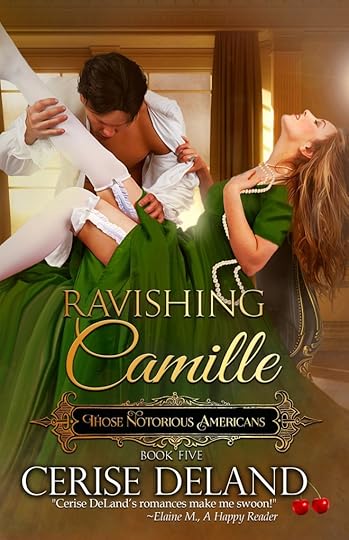
Pierce Hanniford returns to England after tripling his fortune in China. He’s come for business. Not pleasure. And definitely not for love.
Camille Bereston decided years ago that Pierce was not for her. He’s her step-brother, famous, restless, a savvy Shanghai taipan and a menace…to her heart.
She has ambitions to marry. Funny that none of her candidates seems good enough.
Yet Camille excites him as no woman ever has and he must have her, no matter the cost.
But should she take an older, experienced rogue as her lover…and should she claim him forever as her only love?
If you love swoon-worthy historical romance, starring endearing heroes, sassy heroines and a family of irresistible charmers, this book is for you! Buy RAVISHING CAMILLE to begin your journey!
Amazon – Amazon Affiliate – KOBO – B&N – iTunes:
RAVISHING CAMILLE is the fifth book in THOSE NOTORIOUS AMERICANS series but can also be read as a standalone novel.

Book 1: Wild Lily (Lily and Julian)
Book 2: Daring Widow (Marianne and Remy)
Book 3: Sweet Siren (Liv and Killian)
Book 4: Scandalous Heiress (Ada and Victor)
Book 5: Ravishing Camille (Camille and Pierce)
Book 6: If You Were the Only Girl in the World (Katrina and Nate)
Book 7: Let Me Call You Sweetheart (Giselle and Dylan)
https://judeknightauthor.com/wp-content/uploads/2021/06/Those-Notorious-Americans-2.mp4






June 24, 2021
The life of a servant
This BBC series is great. Episode 1 looks at servants in England from the mid 18th century to the end of the 19th. Well worth watching. Here’s an excerpt, about the requirements of a doctor’s wife (lower middle class) in Victorian London.
This is what she wants the housemaid to do,
“Seven o’clock, bring in my hot drinking water.
“Sweep down, thoroughly clean the stairs, “get the bathroom ready and lavatory.”
And then, the servant has her breakfast.
“Eight o’clock, bring my hot water. “Draw up blinds, empty and take away bath. “Always use basin cloth and wipe tumblers.
“8:30, clean grate in drawing room, thoroughly sweep and dust room. “Wipe round parquet, clean all brass.” “Open windows front and back. “Water and wipe with a wet cloth all plants.”
“How to clean a looking glass. “Blow the dust off the gilt frame, “as the least grit would scratch the surface of the glass. “First, sponge it with a little spirit of wine or gin and water, “so as to remove all spots.
“Then, dust the glass over with a powder blue tied in muslin “rubbing it lightly and quickly off “and polishing with a silk handkerchief.”
And then, what you’ll see here is that every minute is accounted for,
taking us through to the evening.
Seven o’clock, we find her tidying the drawing room.
“Put the cushions tidy and tidy the papers. Dust tables and the piano. See to the lights and sweep the fires.
“Eight o’clock, assist and wait at table and after see to bedrooms. Turn down beds, washstands wiped, hot water, chambers and so on.”
Nine o’clock, she has her own supper in the kitchen.
Ten o’clock, she can fall into bed, and that’s the end of her day, until, of course, she gets up and does it all again the next day.







June 22, 2021
Conflict on WIP Wednesday
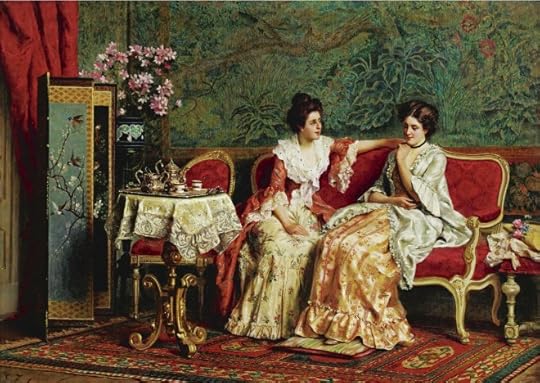
Writing about twins in a double time line, with a book for each, is having its moments. But at least both heroines have someone to talk to. In the following excerpt, my sisters mention key conflicts they need to resolve to find happiness. I’d love to see an excerpt from you where your hero or heroine discusses their principal conflicts.
“You are up early,” Sarah said, appearing in the doorway. “Shall I send for your hot chocolate?”
“A coffee this morning, I think,” Charlotte told her.
Sarah retreated to speak to one of the footmen who waited in the hall to run messages. Charlotte followed her into their shared sitting room. “Could you not sleep, dearest?” she asked.
“No more than you, I think, and for similar reasons.” Sarah sighed. “Are you sure that you cannot marry Aldridge, Charlotte? One has only to see him watching you to know he cares, and he has been remarkably faithful.”
No point in arguing. Sarah knew her too well. “I have given him no encouragement,” Charlotte pointed out.
Sarah raised an eyebrow. “Which makes it all the more remarkable.”
Charlotte shrugged. “Have you forgotten how I found him when I went for his help?” She had told Sarah the whole story the last night. Charlotte blushed at the memory of Aldridge’s naked body with the two women hovering over it. How was she ever going to look Lady Thirby and her friend in the eyes again? Mind you, at least she had been clothed.
Sarah laughed. “You know as well as I do that the Thirby woman has been chasing him this past two seasons. He is not made of granite, Charlotte. He has been a rake, after all, and you have, as you just said, given him no encouragement.”
“Nor will I,” Charlotte insisted, reining in her errant imagination. “You know I can’t, Sarah.”
“You could tell him why not,” Sarah suggested. “You want him; I know you do. Shouldn’t you let him decide whether what he would lose is more important that what he would gain?”
A knock on the door heralded the maid with their morning beverages. Charlotte contented herself with a glare at her sister. When the door closed behind the maid, Sarah showed she’d understood the message. “I am sorry, Charlotte. It is just that I wish you happy.”
“And am I to wish you happy?” Charlotte asked.
Sarah blushed. “I do not know, sister. Uncle James says that I must listen to what Nate has to say, and I know he is right. I do not dare hope, but I find myself doing so, anyway.”
Whereas Charlotte had no hope at all. Only a yearning that could never be fulfilled, and a grief for the life that should have been hers.







June 20, 2021
Tea with Eleanor: Paradise Lost Episode 8

Haverford House, London, June 1812
Eleanor had withdrawn to her private sitting room, driven there by His Grace’s shouting. Her son, the Marquis of Aldridge, was as angry as she had ever seen him, his face white and rigid and his eyes blazing, but he kept his voice low; had even warned the duke about shouting.
“Let us not entertain the servants, Your Grace, with evidence of your villainy.”
Unsurprisingly, the duke had taken exception to the cutting words and had shouted even louder.
Could it be true? Had Haverford paid an assassin to kill the sons of the man he insisted as seeing as his rival? An assassin with a pistol in the woods who had been caught before he could carry out his wicked commission.
His Grace’s jealousy made no sense. Yes, James was back in England, but what did that matter to Haverford?
He had been furious when James and his family attended their first ball, and beside himself with rage when Society refused to accept that the prodigal returned was an imposter. She expected him to continue to attack the new Earl of Sutton with words. Even his petition to the House of Lords to have James’s marriage declared invalid and his children base-born was typical of Haverford. But to pay for an assassin?
He had failed. She would hold onto that. And Aldridge was more than capable of holding his own.
As she sat there with her tea tray, sheltering from the anger of her menfolk, she gave thanks that her son had not been ruined by his father’s dictates over how he should be raised. She had been able to mitigate some of the damage, but more than that, his younger brother Jonathan and his older half-brother David had been his salvation, giving him the confidence that he was loved and the awareness that he was not the centre of the entire world.
Aldridge’s fundamentally loving nature helped, too. He was a rake, but not in his father’s mould. Rather, he loved and respected women, even if he did treat them according to the stupid conventions applied to aristocratic males. And he was a good son.
Putting down her tea, she fetched a little box of keepsakes from her hidden cupboard. The fan her long dead brother had given her before her first ball. A small bundle of musical scores, that recalled pleasant evenings in her all too brief Season. Aldridge’s cloth rabbit. She had retrieved it when Haverford had ordered it destroyed, saying his son was a future duke and should not be coddled. Aldridge had been eight months’ old. Anthony George Bartholomew Philip Grenford, his full name was, but he had been born heir to his father, and therefore Marquis of Aldridge, and by Haverford’s decree no one, not even Eleanor, called him by anything but his title.
Even so, the cloth rabbit had not been the first time she secretly defied her husband. She had been sneaking up to the nursery since Aldridge was born, despite the duke’s proclamation that ladies of her rank had their babies presented to them once a day, washed, sweetly smelling and well behaved, and handing the infants back to their attendants if any of those conditions failed or after thirty minutes, whichever came first.
It was not enough for Eleanor, if she had grown bolder and bolder and slowly taken control of her life, it was for their sweet sake.

Hollystone Hall, December 1791
Eleanor poured tea for Tolly Fitz-Grenford, wondering if he would agree to her plan. After Haverford had exiled David and sent Aldridge off to school, she had pleaded with him to bring them both home, but he had laughed at her; pointed out that she had no power over him. In fact, he declared, her open defiance was enough to cancel the agreement they had made before Jonathan’s birth.
So, she had then packed her bags and retreated to this lesser estate, the one place in the vast Haverford holdings that belonged to Her Grace and not His Grace.
“There, Tolly. Milk and no sugar. Is that not correct?”
Tolly took the cup. “Yes, Your Grace. Thank you.”
She smiled. “We are brother and sister, Tolly. Will you call me ‘Eleanor’?”
Tolly’s face heated. As Eleanor knew, his relationship to the duke was not precisely a secret, but he had never been acknowledged. The father they shared had brought the son of a favourite mistress to be raised on the estate, and had even kept on his half-brother’s tutor to train Tolly in the skills he would need to serve the duchy. Still, he had not been encouraged to show any familiarity, and the duke liked Tolly no more than Tolly liked the duke. “His Grace…”
Eleanor scowled. “I do not mean to concern myself ever again with the opinions of His Grace, except as I must for my safety and that of my children and the servants. Will you not call me by my name, Tolly, when we are not in company? Will you be my friend? For I stand in great need of one.”
Tolly leaned forward to pat her hand. “I will always stand your friend, Eleanor,” he told her.
“Good, for I need your help. Can you find me information with which to blackmail Haverford?”







June 19, 2021
Spotlight on No Lady for the Lord

She was only supposed to care for his wards…not fall in love with him.
He was a carefree rogue…
Lord Ronan Brockman had a perfect life. Handsome, wealthy, and beholden to no one, he was charmed. But that was before he was unexpectedly named guardian to two young girls—and before he met their fascinating governess. Acting on his attraction to the witty beauty would be utter madness. Unfortunately, that doesn’t seem to be enough to dissuade him from pursuing her…
She can never let her guard down…
Mercy Feathers knows more about responsibility than a rogue like Ronan could ever fathom. But to her great consternation, despite his many flaws, she wants him with an all-consuming passion that’s as shocking as it is forbidden. It’s just her misfortune that there’s only one way a relationship with him could end—and it isn’t with happily ever after…
Is their love enough?
Can Ronan and Mercy overcome all that stands between them—including the ghosts of her past—and take a shot at true love? Only if they’re willing to open their hearts and break a few rules…

Secrets, scandals, and sigh-worthy romance.
This sweet, wholesome historical romance by a USA Today bestselling author will have you cheering Ronan and Mercy on as you escape into the past to cheer them on to their much-deserved happily-ever-after.
If you enjoy reading lovable rogues, class difference, and opposites attract clean historical romances with a pinch of mystery and inspiration, a dash of humor, and soul-searing emotion, then you’ll adore Collette Cameron’s captivating DAUGHTERS OF DESIRE (SCANDALOUS LADIES) SERIES. Settle into your favorite reading nook with your favorite beverage for a page-turning, entertaining Regency world adventure you can’t put down.
Amazon – BN – Apple Books – Kobo – Google Play – Goodreads – BookBub
Though this book can easily be read as a stand-alone, most readers prefer to read the series in order.
DAUGHTERS OF DESIRE: A Lady, A Kiss, A Christmas WishNo Lady for the LordLove Lessons for a Lady-Coming Soon!His One and Only Lady- Coming Soon!CHECK OUT COLLETTE’S OTHER SERIES:Castle Brides SeriesHeart of a Scot SeriesHighland Heather Romancing a Scot SeriesSeductive Scoundrels SeriesThe Blue Rose Regency Romances: The Culpepper MissesThe Honorable Rogues®Wicked Earls’ Club
Amazon – https://www.amazon.com/dp/B092KJW3B1
BN – https://www.barnesandnoble.com/w/no-lady-for-the-lord-collette-cameron/1139200201?ean=2940162366768
Apple Books – https://books.apple.com/us/book/no-lady-for-the-lord/id1562251100?ls=1
Kobo – https://www.kobo.com/us/en/ebook/no-lady-for-the-lord
Google Play – https://play.google.com/store/books/details?id=GxsoEAAAQBAJ
BookBub – https://www.bookbub.com/books/no-lady...







June 17, 2021
A 15 foot wave of beer
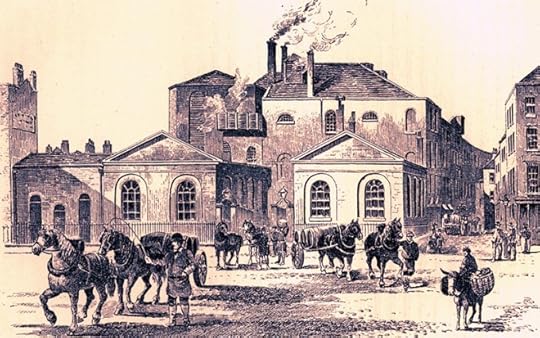
The Horseshoe Brewery, St Giles
St Giles was one of the roughest parts of London in 1814. Its residents were poor–labourers, piece workers, criminals, prostitutes, and others down on their luck. That luck was about to get a lot worse near the Horseshoe Brewery on 17th October 1814. The brewery stood on the corner of Great Russell Street and Tottenham Court Road, and produced more than 100,000 barrels a year of dark porter.
When a storehouse clerk, George Crick, inspected the 22 foot high fermentation vat in the afternoon of that day in October, he noticed that one of the 700-pound iron hoops that held the vat together had slipped off. His supervisors said it was nothing to worry about, and told him to write a note asking for it to be fixed. At 5.30, George heard an explosion. The hot fermenting ale had burst free with such force that it tore the vat to splinters, knocked down the brewery’s back wall, and set off a chain reaction among the other fermentation vats and barrels in the building. Workers climbed on tables, and scrambled up walls. But several needed to be pulled free from rubble or rescued from the surging liquid.

An engraving of the event made at the time.
The first death was a 14 year old servant girl, who was scouring pots at a pump when the wall of the Tavistock Arms fell on her. The 1.3 million pints of beer in the first vat, augmented to 3.23 million pints by the rest of the burst containers, flooded from the building in a wave 15 feet high. The flood swept away everything in its path. It inundated basements causing the tenements above to collapse. In one of those basements, five women were holding a wake for a two year old boy who had been killed the previous day. All five drowned. In all, eight women and children died.
Hundreds of people gathered the spilled beer in containers, or simply drank what they could on the spot. As the flood subsided, spectators came from all over London to see the sight of the disaster, and the local watchmen made a bit of money charging a penny or two to see the damage the flood had done.
That part of St Giles reportedly stank of beer for months afterwards.
Note to self. To Claim the Long-Lost Lover is set in London in the last months of 1814. Mention the smell in the scene I set in St Giles towards the end of November.







June 15, 2021
Inner dialogue, ghosts, and imaginary mentors in WIP Wednesday.
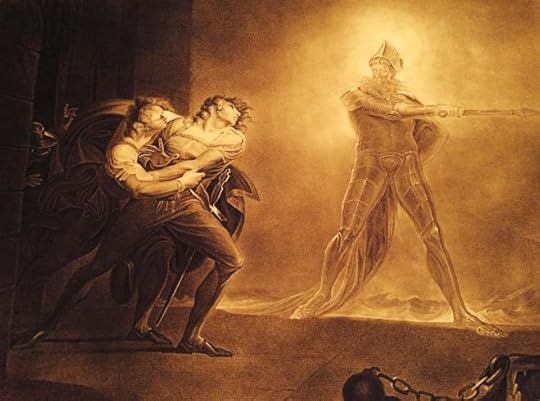
To Claim the Long-Lost Lover has gone to the editor, and I’m about to work on the second half of To Tame the Wild Rake. But first, I’m looking at what comes next. Either Chaos Come Again or The Darkness Within, and I’ve already started The Darkness Within. In The Darkness Within, my hero has an inner dialogue going on with someone called Sebastian. Sebastian harasses, advises, and goads him. Mad thinks he is being haunted. It could be a ghost. Or it could be a memory. Or perhaps my hero is unbalanced. I think I’ll leave it up to the reader to decide.
If your protagonist talks to herself or to a dead aunt or to anyone else invisible to all the other characters in the story, please share an excerpt in the comments. Here is mine.
“Stedham was looking for a home; a purpose,” Max told Sebastian. The lieutenant had tried being a steward on an estate, and moved on. He had worked for a while in a lawyer’s office, and a few months more as secretary to a Member of Parliament. The last address the sister had for him was a vicarage, and the last contact a cryptic note from the vicar. Max was heading there now.
“Paul hasn’t been able to settle since he returned from the wars,” the sister had told Max.
Her husband’s estimation was harsher. “He cannot stick to anything. Some of those ex-military men are like that. They need the adventure, the thrills, and they’re no use in ordinary life. He should join up again.”
Max didn’t agree. “Stedham was a good soldier, but he wasn’t made for that life. Not really,” he told the man, but he might as well have talked to the wall.
“You don’t know him like we do,” the brother-in-law said.
“That man wants his wife to himself,” Sebastian commented. “I know jealousy when I see it.”
Max thought the ghost might be right. Sebastian usually was right about the darker emotions. “Stedham needs a place to belong, but his sister’s home wasn’t it.” Stedham could hardly have missed the lack of welcome. Was that why he stopped writing to his sister? But he’d only stayed with the pair for the first two months after arriving home from France in 1814. He’d continued to write faithfully, week after week, until a few months ago.
“No one belongs,” Sebastian argued. “Belonging is an illusion, and the ones you love most are the ones who most hurt you.”
Max ignored the oblique reference to Sebastian’s death.







June 13, 2021
Tea with Eleanor: Paradise Lost Episode 7

A Haverford townhouse in Brighton, May 1812
Eleanor opened the secret compartment of the escritoire that travelled everywhere with her. She didn’t bother with Tolly’s notes, but she did bring out the box of wooden toys that David had carved for his half-brothers. Aldridge’s soldiers were particularly fine, the paint barely flaking. David had made them for Aldridge’s twelfth birthday, and Aldridge never touched them again after Haverford threw David out.
Four-year-old Jonathan had been grief-stricken, though not as broken-hearted as Aldridge. Not that Aldridge spoke of it, then or later, but she’d seen the change in him; seen, too, the devastation he’d suffered when he and David met again, just a few years ago, only to be split even more decisively. That time, he’d admitted to Eleanor that he blamed himself: for Haverford’s actions when he was twelve and David seventeen, and for the mistake that nearly cost David the life of the women he and Aldridge both loved.
Eleanor ran her hands over the scarred and dented head of the push-along toy David had made Jonathan so he wouldn’t feel left out when Aldridge got his present. The stick to push it had long since gone. It had been Jonathan’s favourite toy for years, till the pegs that made the legs move broke so they dangled, and the paint was completely worn away. A few specks of the bright colours it had been painted remained in the cracks. Eleanor kept it as a memento of the happy times with all three boys, when they stayed at Haverford Castle, and the duke did not.
Perhaps it could be repaired? If Jonathan ever married and had a son, she would like him to have it.
She chuckled at her own hopeful dreams. Certainly, nothing in his letter indicated the approach of that day! And, to be fair, he had no need to wed. He was a second son, independently wealthy, and could please himself. She just wished he would do it in England.







June 12, 2021
A prayer-poem for Sunday

Would I might wake St. Francis in you all,
Brother of birds and trees, God’s Troubadour,
Blinded with weeping for the sad and poor;
Our wealth undone, all strict Franciscan men,
Come, let us chant the canticle again
Of mother earth and the enduring sun.
God make each soul the lonely leper’s slave;
God make us saints, and brave.







June 10, 2021
Paradise is a garden
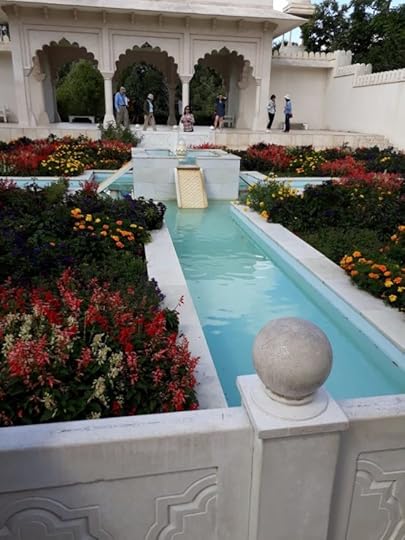
The Paradise Garden at Hamilton Gardens
Creative inspiration is a strong and wonderful thing. Artists — storytellers in particular — are often asked where their ideas come from. The answer ‘everywhere’, though true, is unhelpful. What questioners really want to know is ‘why did this idea strike you at this time’.
The Greeks credited the muses — nine goddesses who inspired the arts. The Jews spoke of Holy Wisdom. My friend Caroline Warfield calls inspiration the girls upstairs. I tend to blame an infestation of plot elves.
Stories and the elements that enrich the weave of a story are all around us all the time. Most people notice one or two of the hundreds of possible ideas that pass them every day. An author might pick up a dozen. Knowing what to do with them matters more.
Several years ago, Caroline and her beloved visited New Zealand. On the day they arrived, we had lunch at Hamilton Gardens, which has more than a dozen themed gardens: Japanese, English cottage, Chinese, Maori vegetable, formal Italian.
We were both writing novellas for the coming Belle’s Christmas collection, Follow Your Star Home, and in the Mughal garden, I found a unifying idea that later became the inspiration for the title of the book, the name of the kingdom my hero and heroine rule, and one of the locations for the story. My photos of that garden also appear on the cover.
The hero and heroine were the parents of the lead characters in my current series, The Return of the Mountain King, and the novella is now published as a prequel. It is called Paradise Regained. I’m currently publishing the companion volume, about the girl James left behind when he left England, on Mondays. It is called, of course, Paradise Lost. Once I finish the fourth novel in the series, which will be within the month, I’m going to write a happy ending for my poor duchess, call it Paradise Attained, and publish it in a volume with the other two novellas.
Paradise is a garden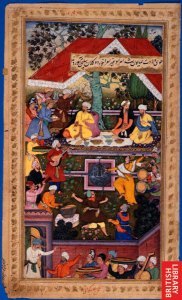 The garden we found in Hamilton was a chahar bagh. The term means ‘four gardens’. It’s a quadrilateral layout, with the quarters divided by walkways or flowing water into four smaller parts and a pavilion at one end raised on a terrace. One of the world’s most famous tombs, the Taj Mahal, was originally a chahar bagh, though only two of the gardens remain.
The garden we found in Hamilton was a chahar bagh. The term means ‘four gardens’. It’s a quadrilateral layout, with the quarters divided by walkways or flowing water into four smaller parts and a pavilion at one end raised on a terrace. One of the world’s most famous tombs, the Taj Mahal, was originally a chahar bagh, though only two of the gardens remain.
Gardens divided by watercourses first appeared in Mesopotamia, and were later adopted by the followers of Islam. It may have been the Islamic influence that fixed the shape to four, referencing the four gardens of Paradise that are mentioned in the Qur’an. Genesis, too, mentions the central spring that feed four rivers, each flowing into the world beyond. The concept travelled with Islam, so charar bagh gardens are found from India to Morocco.
“In Chahār-Bāghs, terraces symbolize the cosmic mountains, the creation of the edifice or throne at the highest level represents the position of God. A great pool is placed in front of the edifice representing the cosmic ocean as the source of all waters which can irrigate the whole garden. The presence of trees, flowers and animals around the edifice complement the figure of the universe” (Farahani, Motamed & Jamei, 2016 — from https://www.researchgate.net/publication/321014499_A_discourse_on_the_Persian_Chahar-Bagh_as_an_Islamic_garden).
The wall is a crucial design feature in making this a Paradise Garden. Indeed, the words para daisa mean walled garden — pairi = around, daeza = wall or brick.
As a gardener myself, I appreciate the protection a wall can offer a garden, and I also think of Francis Bacon’s quote as I garden.
Paradise RegainedGod Almighty first planted a garden. And indeed, it is the purest of human pleasures.
In Paradise Regained, you’ll find the heroine, Mahjad, relaxing in the chahar bagh her husband built for her as a wedding present. Mahzad and James have called their kingdom, built high in the Kopet Dag mountains between Iran and Turkmenistan Para Daisa Vada — Paradise Valley. And the story is about temptation — particularly for James.
In discovering the mysteries of the East, James has built a new life. Will unveiling the secrets in his wife’s heart destroy it?
James Winderfield yearns to end a long journey in the arms of his loving family. But his father’s agents offer the exiled prodigal forgiveness and a place in Society — if he abandons his foreign-born wife and children to return to England.
With her husband away, Mahzad faces revolt, invasion and betrayal in the mountain kingdom they built together. A queen without her king, she will not allow their dream and their family to be destroyed.
But the greatest threats to their marriage and their lives together is the widening distance between them. To win Paradise, they must face the truths in their hearts.
Find buy links at Books2read https://books2read.com/paradiseregained
***
This video shows the Paradise Gardens section of Hamilton Gardens. The chahar bagh is on from 3:12 to 3:46, but the rest are lovely, too.
***
Excerpt
The courtyard had been designed to catch and hold the fickle warmth of the mountain sun. Even in early winter, Mahzad and her ladies chose to settle in the pavilion, out of the direct heat, though the children and their nursemaids played on the paving by the cross-shaped pool at the centre of the garden.
James had ordered it built: a paradise garden on the Persian chahar bāgh model, centred on water and divided into four quadrants, each richly planted in vivid colours. It had been her wedding present, and somehow, their tribe had managed to keep it a secret from their queen, though the qaḷʿa, the citadel, buzzed with intrigue until James had brought her here, blindfolded.
It had been full summer, and the garden had been glorious but not as beautiful to her eyes as the face of her husband, eyes alight with mischief, with love, and with a promise for later that night when the court was asleep. They had crept down when the qaḷʿa fell silent, giggling when the patrolling guards politely averted their eyes. Mahzad was confident their eldest son, Jamie, had been conceived that night.
She had been so in love, had been convinced that James had forgotten the English woman for whom he was exiled from his home and had fallen in love with her.
Eleven years and eight children later, her love was deeper and stronger than ever, but she no longer believed that James returned the feeling. He was fond of her, yes. He respected her as his wife and queen, katan to his kagan, but the passion of the soul? No. She reached for it with her own and met only the barrier of blank civility with which he armored himself from the world.
When he was home, he was distant if polite, and he had not been home in more than seven months. His trips away had become longer and longer, his letters home more and more formal. He was about the business of their kaganate, which prospered under their rule, but he had never before failed to be home for a birth of one of their children.
Mahzad dropped a kiss on baby Rosemary’s dark hair, handed the sleeping baby to the hovering nursemaid, and sent one of her ladies to summon her secretary. She had work to do. She was co-ruler of their people and did not have time to waste mourning the fickleness of men.
The messenger was only halfway down the long side of the garden when Patma came hurrying down the steps from the zenana, the women’s section of the palace. Even from the other end of the garden, Mahzad could see that her secretary was agitated about something. She had lost the calm she had adopted as chief of Mahzad’s scribes, her usual elegant glide abandoned for a walk that bordered on a run, her eyes wide with excitement. She was not surrounded by the bevy of undersecretaries who carried her desk and writing tools, prepared her ink, ran her messages, and made copies of lesser documents.
No. There they were, just stepping out of the long doors onto the zenana’s terrace. Patma must have hurried some distance to have so outstripped them.
The secretary did not pause when she passed Mahzad’s messenger, speaking over her shoulder as she skirted a small child pushing a toy pony and hurried up the steps to the pavilion. She stopped at the top of the steps to kick off her footwear before venturing on to the rugs that lay everywhere and then composed herself enough to offer a polite greeting, bowing as she said, “Peace be upon you, my queen.”
“Peace, most excellent of scholars,” Mahzad responded, inclining her head as she waited for the younger woman to burst with whatever news she carried.
(The original version of this post was written for Highlighting Historical, Caroline Warfield’s blog, in 2019.)










